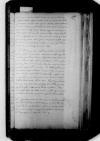Letter #5756
Alfonso de VALDÉS to Ioannes DANTISCUSs.l., [1528-09 – 1528-12-17?]
English register:
Valdés admires poems Dantiscus keeps giving him. He agrees with Dantiscus that Cato [Lodewijk van Praet] has a slightly uncouth mind; he jokingly reproaches Dantiscus for wasting his talent on writing poems about this. He informs him that the letter Dantiscus requested is already awaiting the emperor’s signature. Valdés will be happy to have Dantiscus as his guest or he himself will come to visit him.
Manuscript sources:
Auxiliary sources:
Prints:
| ||||||||||||||||||||
Text & apparatus & commentary Plain text Text & commentary Text & apparatus
Salutem.
Itane tuis me subinde deliciis cf.
ms 1 2 isto⌈istocprint 1 istoc,
ms 1 2 isto⌉ pectore, quam a montibus fluunt flumina? Emoriar, ni id ipsum, quod cf. , CIDTC IDP 176⌊scribiscf. , CIDTC IDP 176⌋ de
print 1 ni fallor⌈(ni fallor)ms 1 2 (ni fallor),
print 1 ni fallor⌉, agreste. Sed ms 1 2 nonne,
print 1 ne⌈nonnems 1 2 nonne,
print 1 ne⌉ tu nimium prodigus es, qui tuas delicias sic effundas, vel, ms 1 2 (si dicere fas est),
print 1 si dicere fas est⌈(si dicere fas est)ms 1 2 (si dicere fas est),
print 1 si dicere fas est⌉, stultus,
cf. Vulg. Mt 7.6 Nolite dare sanctum canibus: neque mittatis margaritas vestras ante porcos, ne forte conculcent eas pedibus suis, et conversi dirumpant vos ⌊qui margaritas
print 1 proicias,
ms 1 2 proicis⌈proiciasprint 1 proicias,
ms 1 2 proicis⌉
porciscf. Vulg. Mt 7.6 Nolite dare sanctum canibus: neque mittatis margaritas vestras ante porcos, ne forte conculcent eas pedibus suis, et conversi dirumpant vos ⌋. Litterae, quas a me petiisti, print 1 confectae,
ms 1 2 infectae⌈confectaeprint 1 confectae,
ms 1 2 infectae⌉ sunt. Curabimus, ut subscribantur a
Vale.

 BK 222, No. 47, p. 188
BK 222, No. 47, p. 188